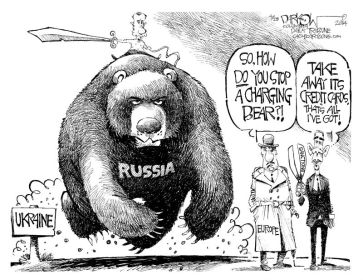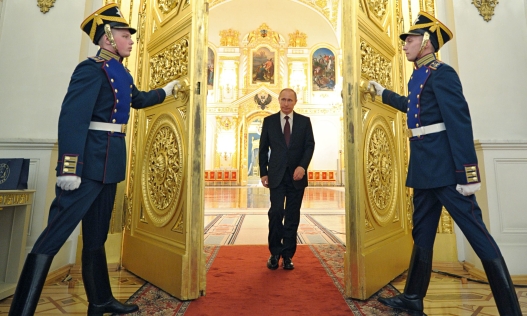Vladimir Putin – “Hero of Russia”
In Russia it has become a routine to hear people and also opposition politicians say that the best for Russia will be if Vladimir Putin will remain in power as long as possible. Otherwise, the situation could be even worse.
According to Levada Center, Putin´s popularity reached the approval rating of 85,5 per cent in August 2014, and almost 88 per cent in November 2014. He has even become the Man of the Year in Russia for the 15th time in row since 1999. His high popularity is very impressive if we take into consideration the situation in Russia caused by events in Ukraine and the Western sanctions. But why is it like that?
According to Pyotr Romanov (Romanov P., 2014), historian and journalist, Putin´s high popularity is caused by the Western pressure and sanctions. So that explains his popularity, but it does not explain why he has remained consistently so popular since the late 1990s when he was a prime minister of the country. It is not very common for any politician in any country to remain so popular for so long.
Romanov says that the rise of Putin popularity lies in the mentality of the Russian people, who tend to believe in national heroes and saviors. After  the series of Soviet leaders who brought more disappointment than enthusiasm, such as Yury Andropov, who was half-living, Leonid Brezhnev, who was senile, and Mikhail Gorbachev, who was good in speech but poor leader, Russian people finally found a leader, who would be able to meet their expectations.
the series of Soviet leaders who brought more disappointment than enthusiasm, such as Yury Andropov, who was half-living, Leonid Brezhnev, who was senile, and Mikhail Gorbachev, who was good in speech but poor leader, Russian people finally found a leader, who would be able to meet their expectations.
Despite the high expectations, Putin managed to keep his support from people not because they are stupid, but because he depicts the traditional Russian values and priorities. During the time as a leader, he has achieved many successes, what Russians highly appreciate. And he also continues to ´keep a tight hold´ over the country´s affairs, Romanov says, what everybody, who remember chaos from 1990s, considers a great progress.
Even though Putin represses the opposition, many people think it is not a big disadvantage because they do not consider the opposition politicians as very important. Do you think that Russian people are wrong? Maybe, but Romanov claims that the problem is in the opposition itself. For decades, the opposition has been failing to create a real contact with Russian citizens and provide any alternative to the recent development.
Putin also pursues a foreign policy that is independent from the West, what Russian people support as well. The government is worse with the solving social problems, but it manages to maintain at least the minimum required to keep the public happy. And he is also trying to restore the condition of Russian´s army, what is very important for Russian patriotic citizens.
In contrast to that, there is also rising question about propaganda and its influence on Putin´s image of strong man in Russia and in the international news media. Russia has been criticized for censorship and propaganda over centuries. However, it is argued that over the last year, the Russian propaganda machine has pursued a two-pronged strategy towards its domestic audience. The first prong, used to justify Russia´s takeover of Crimea, is a replay of what Hitler called the ´Big Lie´- a false historical narrative in which the pro-democracy forces in Ukraine are portrayed as US-backed fascists out to commit genocide against ethnic Russians. Repeat a story as many times as possible, the idea goes, and a majority of the population will come to accept it.
The second prong, adopted after the downing of Malaysia Airlines Flight 17, might be called the ´Big Confusion´. Faced with an event that threatens your Big Lie, starts a disinformation campaign. Fill the domestic airwaves with so many bizarre rumours, conspiracy theories, and paranoid fantasies that a cynical public stops caring what really happened.
It has been also argued that Russia´s propaganda effort also has a global dimension. In the last few years, the Kremlin has launched a slick, fast-paced satellite TV channel ´Russia Today´, which pays top salaries to British and American broadcast journalists willing to repeat the same messages in English. A surprising number of viewers are tuning on (Bayles, 2014).
So, the question is: Is Putin´s domestic support so high because Russian people really believe in their leader and accept his domestic and foreign policy, or is it because he keeps the public in the dark? Opinions about that vary, however, the truth is that Russia does not really have any potential successor to Putin at the moment, and thus, there is a fear among the people connected with the inevitability of Putin leaving the political scene one day, leading Russia to unknown and maybe even worse situation.
References:
Bayles M., 2014, Putin´s propaganda highlights need for public diplomacy, The Boston Globe, Boston http://www.bostonglobe.com/opinion/2014/07/28/putin-propaganda-highlights-need-for-public-diplomacy/9tyuKdtfqG2YqjR5mTd3IM/story.html, accessed May 2015
Romanov P., 2014, Putin´s popularity masks an uncomfortable reality, The St. Petersburg Times, http://www.sptimes.ru/story/40634?page=1#top, accessed January 2015
The Moscow Times, 2014, Putin nominated for Russia´s highest honor, ´Hero of Russia´title, http://www.themoscowtimes.com/news/article/putin-nominated-for-russia-s-highest-honor-hero-of-russia-title/504236.html, accessed January 2015
SITA, 2014, Rusi si za muža roka po 15-krát za sebou vybrali Putina, Pravda, http://spravy.pravda.sk/svet/clanok/339830-rusi-si-za-muza-roka-po-15-krat-za-sebou-vybrali-putina/, accessed January 2015
http://openiazoch.zoznam.sk/cl/143141/Velikan-aj-okupant-Putinova-popularita-po-invazii-na-Krym-v-Rusku-stupa-preco-sa-vlastne-tlaci-na-Ukrajinu, accessed January 2015

While this post is of undoubted interest and responds to questions about Putin’s leadership, you need to think about how it relates to Public Diplomacy and Global Communications.
Therefore, I suggest you need to consider what Putin’s leadership means in terms of questions of:
1. Propaganda and political power. How has Putin created a strong man image and how does this play out in the international news media. How have Putin’s communications advisors determined a political system to contradict Western media interests?
2. The use of Russian news media outlets such as Russia Today as centralized news organisations and what this means in terms of state power and censroship.
3. A means of Public Diplomacy to win over international public opinion. Has Russia been successful? How did the Sochi Winter Olympics relate to the annexation of the Krimea and support of the Ukrainian Russian speaking seperatists.
These are suggestions, but the post MUST be relevant to the module’s themes and concerns.
LikeLike
An interesting observation. However, I don’t doubt that Putin has some real support in Russia, but I doubt that they reflect what the Russian people actually think, and the real result is hard, if not impossible, to obtain in such a country. Therefore, I would take those numbers with a pinch of salt.
LikeLike